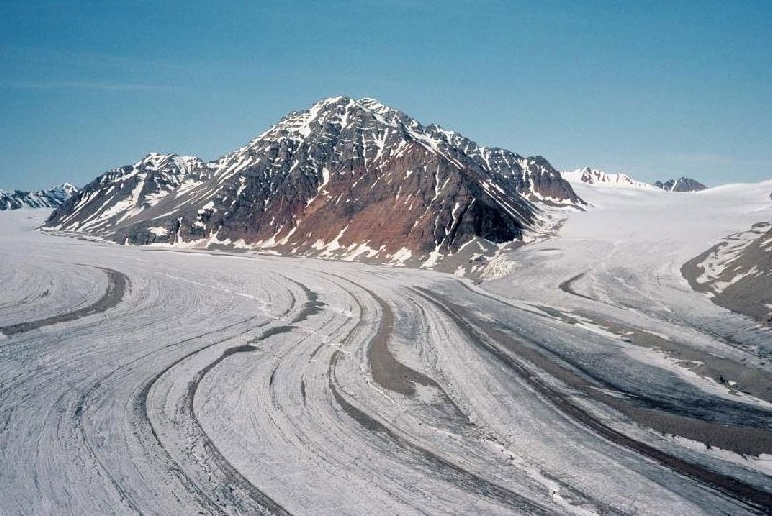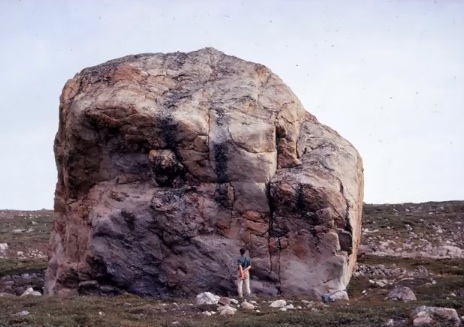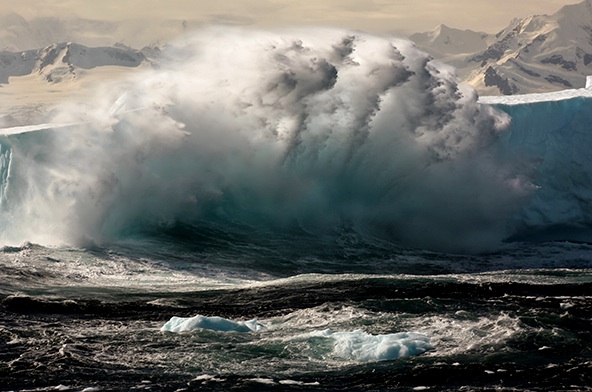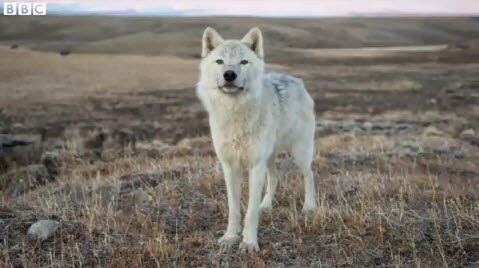Reviews
|
Acts of God is set in the early 1960's, in a world vastly different from the one we now know. Fifty years ago it was a man's world, systematically being explored and equally exploited by those willing to take up the challenge, provided they could find the funding. It was a time of discovery with much still unknown and unexplored; a time of high adventure celebrating masculine strength and endeavor in the quest of conquering the wilds. This bore sharp contrast to then the role of women, the weaker fairer sex who dutifully practiced patience in the safety of their homeland.
Brian John weaves his icy web of intrigue set in the vast tundra arctic wastes of Greenland, where the Cold War like permafrost lurks unseen yet ever present; one only has to scrape away the surface and there it is. The beauty of Greenland is so inviting, a landscape brimming with scientific information just waiting to be recorded, yet a place so deadly unpredictable and volatile that only the brave should ever venture forth. Eight young academics, all men of science, from a mixture of classes across the social strata leave the safety and order of Britain on an academic venture of a lifetime. Each comes with their own motivation, whether great hopes to further a career, or born of the the need to run away from problems; little do they know that they are walking into a world not only environmentally unpredictable but also equally politically volatile. The plot builds like a great web of deceit and intrigue, weaving around them, drawing them ever onwards and deeper into peril. John's incredible knowledge of this stark yet majestic wilderness with its indigenous peoples, and its flora and fauna, together with his meticulous attention to detail makes the experience so real one is almost hearing the ice cracking. At times I found myself holding my breath waiting for the inevitable, this book engaged me on all levels, my mind raced to piece together clues, my heart soared with the beauty and emotions, and the hair on the back of my neck stood on end as I felt fear. I could not put it down until I had finished, a thoroughly good read. Allison Beldon-Smith Talog Carmarthenshire, Wales -------------------- Most enjoyable! Brian John gives a new meaning to Cold War as an Oxford University arctic expedition finds itself unwittingly involved in the clandestine machinations of the early 1960s. Set against a broad canvas of mountains, glaciers, ice dammed lakes, tundra, pack ice and icebergs, eight young scientists pursue their researches through a beautiful but often hostile Greenland summer. But the team are plagued by a series of incidents and deaths that, over time, appear to be more than mere accidents. Acts of God, acts of sabotage or simply collateral damage? Russian spies, an enigmatic mining company, furtive shipping movements and the occasional air strike are clues to a sinister testing programme and high level complicity between governments. The truth is gradually revealed, but how can the surviving expedition members escape with their lives and knowledge intact? Brian John, himself the leader of the 1962 Oxford University East Greenland expedition and a past member of the British Antarctic Survey, draws on a lifetime’s experience as a geographer and glaciologist to paint an evocative picture of the arctic, its wildlife and its indigenous peoples. The plot is pure imagination (I think!) but hardly fantastical when we recall that the Cuban missile crisis was to bring the world to the brink of nuclear war less than a month after the denouement of Acts of God. Barrie Foster, Mathry, Pembs, Wales --------------------------------- I really enjoyed the book immensely. I found the first chapter to be a bit confusing -- however, I now understand the setting up and foreshadowing that was happening for the upcoming chapters. Chapters 2-9 also seemed too obsessed with one disaster (Act of God) after another. However, chapter 10 -- WOW! The lights went on, there were bells and whistles and I literally could not put the manuscript down. Chapter 10 was literally a page turner. I also found chapter 15 & 16 equally exciting. I really enjoyed how in chapter 15 things came together and key information about the conspiracy was uncovered by the expedition. Your repeated adherence to descriptive language was great. The denouement in the final scene was priceless. With this being said, I really enjoyed your detailed and descriptive writing style. I plan to look for more of your books. Janet Blue Bloomington, Illinois, USA --------------------- Book review
Brian S. John (2014). Acts of God. Greencroft Books, Newport. ISBN: 978-0-905559-99-5. 296 pp, £7.99; Kindle edition: ISBN 978-0-905559-53-7, £1.99. When I received an email from Brian asking me whether I would know of anybody who would like to review his new book Acts of God, I was initially taken aback as I didn’t think it would be relevant for QN – until I read the background to the book, which made me reconsider my initial hunch. Based in Greenland, drawing heavily on his own experiences of an Oxford University expedition to East Greenland in 1962 and written with the background of someone who knows their glacial geomorphology (the seminal textbook co-authored with David Sugden in 1976 will be familiar to many members), yet has also changed career to become an independent fiction and popular science author, this tickled my interest. I had seriously planned to find someone to review it – until I started reading the first few paragraphs, which are full of foreshadowing, and found myself, a few hours later, still reading. Given I don’t normally read much fiction, this says something. Captivating is indeed a word I find rather fitting in this context as I found it hard putting the book down, especially as it approaches the grand finale. The book itself starts by meticulously switching between ominous events involving two Russians landing in East Greenland and the description of the main characters of the story: on the one hand, there are the members of an Oxford University expedition to Greenland (one can perhaps imagine who served as the sources of inspiration for some of the characters!), on the other some of the local population in East Greenland and the (mainly military) staff of a US outpost through which the expedition receives logistical support and backup. The story is set in the early years of the Cold War, and this theme is cleverly kept alive by several references to the political climate at the time that make the book appeal realistic even to those, like me, who were fortunate enough to capture only the latter, calmer half of that post-war period. The chapters are arranged in chronological order, starting with early July of 1962, which adds to the dramatic nature of the finish later on. Throughout, the story takes several unexpected twists and turns and keeps a fairly complex story arc alive. The latter is easy to follow due to the diligently and realistically-described landscape setting, the geomorphological processes occurring in it and through incorporating realistic and well-planned character traits of the expedition members and the other players. In addition to aforementioned story arc, this is probably the most realistic fictional account of a high-Arctic landscape in a crime-novel context (is it sad to admit that reading frequent references to ‘crevasse’, ‘moraine’ and ‘sediments’ in a fictional novel made it more appealing?). From the perspective of someone with extensive field experience in cold regions (albeit not Greenland, yet!), this makes the reading even more interesting and brings to life the similarities, but also differences, between fieldwork back then and today. Through its autobiographical elements, rooted in Brian’s own Arctic expedition experiences, the book has a historical element by bringing to life how much more easily accessible the northern regions have become and how backup is now somewhat (!) easier due to easier communication systems (Iridium phones, emergency beacons, lighter equipment, denser network of research stations etc.) that did not exist back then. At the same time, the natural hazards (and otherwise) are portrayed just as realistically, and the detailed description of these in a very informed way hammer home the key roles of planning and awareness in doing successful fieldwork in the Arctic and other remote cold and mountain regions. To summarise, I can only recommend Acts of God to anyone interested in reading a well-informed, entertaining and, I say it again, captivating historical crime novel set against the backdrop of early-Cold-War Greenland. A very worthwhile read! Sven Lukas School of Geography Queen Mary University of London Mile End Road London E1 4NS [email protected] |
Having been completely captivated by Peter Høeg’s Miss Smilla’s Feeling for Snow (1992), I embarked on Brian John’s thriller set in Greenland with enthusiasm – there is something about the starkness of the Arctic landscape and the resilience of the Inuit people that is hugely addictive.
John’s ability to take you into region, as if you were there, is a naturalistic tendency I had enjoyed in his Mistress Martha novels set in 19th-century Pembrokeshire. So I decided to join him on a rather different journey rather further North. Acts of God is a brutal, blokeish novel set in the unforgiving frozen expanses of Greenland and the attention to detail outlining every ridge, crevasse and weather formation is brilliant. The plot, where some young university explorers get in the way of a seemingly government-sanctioned extraction project whose secrecy seems carte blanche for killing off the hapless ‘amateurs’ seems almost incidental to the rawness of the topography and the elements. Definitely worth the journey but not for the squeamish". Clarissa Dann London, UK ---------------------------------- Acts of God by Brian John is quite the ripping yarn. Eight young scientists from various backgrounds and different fields are thrown together on a scientific expedition to Greenland in 1962, but these men get more than they bargained for when they are beset by a series of disasters which at first appear to be Acts of God, such as tidal waves, avalanches and heavy rock falls. These turn out to be caused by human intervention, rather than any deity, and throughout the story there is the underlying sense of the threat of the Cold War. In this setting you get the feeling it's a man's world and these young men have to toughen up pretty quickly, given the predicaments they find themselves in as they get caught up in murder, betrayal and espionage. Although at times you feel you are strolling through the pages of a National Geographic magazine, it helps you to envisage the stark and rugged beauty of the almost alien-like Greenland landscape. It also gives you an insight into what the eager young scientists were hoping to achieve with their expedition - which goes horribly wrong. The story builds slowly, but when the action kicks in it's heart-stopping stuff. Helen Howes Auckland, New Zealand ----------------------------------- I have to declare an interest, and confess a life-long fascination with the North, having visited Norway and Sweden on three occasions, Shetland three times, and a second trip to Iceland is on the horizon. Greenland and Svalbard are in the pipeline. Geography, particularly Physical Geography, was my favourite subject at school. Indeed it was school trips to Norway that first seeded my fascination with Scandinavia. Therefore I needed no persuasion to read a novel based on direct experience of a scientific expedition to Greenland in 1962. The book operated for me in several different ways. The descriptions of the landscape of Greenland were lyrical, no doubt born out of the author’s love for the northern wilderness. The violence of the melting icebergs and the swollen rivers during the explorers’ summer, the associated dangers and the deaths by natural causes were sobering. We see the erosion of an ancient way of life by modern economic developments and by global tensions. The interactions between the team members I saw initially as almost mundane descriptions, but then in such a trip there are mundane activities and duties to perform. However, as the story unfolds and the violence moves from the natural world into that of human conflict, characters and relationships develop. Other aspects of animal and human life in Greenland are well-described, and different elements of the story begin to interlock Having grown up during the Cold War, with the daily possibility of nuclear weapon conflict, I always believed it was anything but cold. The war was always lukewarm at least. Proxy wars in Korea, Vietnam and elsewhere were brutal. It’s no fantasy that both superpowers were also engaged in more secret conflict in Greenland and elsewhere. The cold, clinical, cynical and brutal violence perpetrated by both sides and depicted here is shocking, but honest, and needs to be brought to our attention. The dangers faced by the expedition members become more than risks of natural disaster, and the story becomes compelling. Will I get to Greenland? I intend to do so. I can spend my time reading factual guides, and on Google Earth, and feed my fascination. But now, thanks to ‘Acts of God’, I have additional pictures in my mind. The book is only barely a fantasy, only just, only barely beyond the possible. And this was the paranoid 1960s, when our V-bombers were able to be in the air within a couple of minutes to go on to defend millions by destroying millions. The author knits all the elements together: landscape, nature, people, politics, and global conflict. Above all, the landscape remains, scarred, but magnificent. Do read this book. Philip Deacon -------------------------------------------- |




